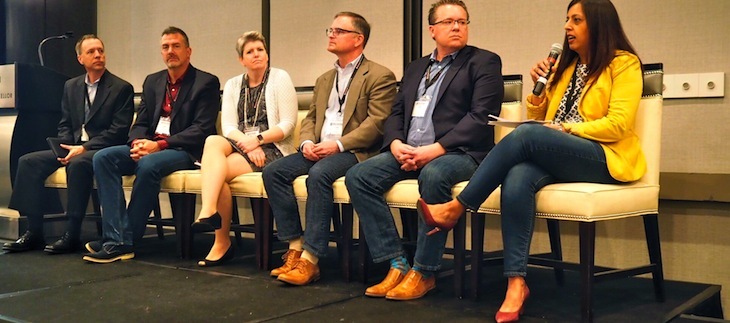UA conference attendees discuss blockchain disruptions, benefits
by April 8, 2018 5:34 pm 977 views

(from left) Kevin Yoder, associate director of innovation at ArcBest; Jeff Charlson, CEO of Bike Rack Brewery; Misty Decker, academic program director at IBM; Jay Davidson, vice president of technology at J.B. Hunt Transport; Lee Slezak, vice president of IT architecture at Tyson Foods and Archana Sristy, director of engineering global business services at Walmart. The group was part of a panel discussion held April 6 in Fayetteville as part of the University of Arkansas Blockchain Conference.
Blockchain is seen as another disruptive technology – along with machine learning, internet of things and virtual reality – that has the potential to impact nearly all business sectors.
There isn’t anything sexy about blockchain, but the technology can provide transparency to the supply chain, reduce the “friction” of money transfers and provide an alternative source of power to a community in Brooklyn, N.Y.
More than a 100 people attended the University of Arkansas Blockchain Conference Friday (April 6) in Fayetteville. The UA Walton College organized a blockchain consortium in early 2017 bringing in industry partners like ArcBest, Walmart, Tyson Foods, IBM and J.B. Hunt to study blockchain applications as they pertain to business.
Officials with Fort Smith-based ArcBest and Northwest Arkansas-based companies Walmart, Tyson Foods and J.B. Hunt shared their views on blockchain and impacts to the industries of retail, transports and food processing. Each company has been working on pilot projects using blockchain in their respective industries for the past couple of years. Hunt and Walmart are each part of industry consortiums trying to standardize the blockchain framework for that sector.
Keynote speaker Dr. Mary Lacity, distinguished professor and international business fellow at the University of Missouri at St. Louis, said blockchain is now a $6 billion business and there are roughly 1,500 startups working on blockchain applications.
“A blockchain is a decentralized, peer-to-peer system for validating, time-stamping and permanently storing transactions on a distributed ledger that uses encryption protocols to authenticate digital asset ownership and consensus protocols to prevent double spending, to add validated transactions to the ledger and to ensure the ongoing integrity of the ledger’s complete history. Some blockchains also use smart contracts that apply rules to automatically execute transactions based upon pre-agreed conditions,” Lacity said.
Blockchain requires sharing data and trusting the sources of the data in the network. She said the financial industry has studied blockchain for several years because when used correctly it can ease the money transfer process. It is blockchain that made Bitcoin possible because it does not require the use of intermediary banks on cross border transfers like the traditional banking system.
She said if a person wants to transfer money from a bank account in France to the U.S. there are five steps that must take place. Money moves from a French bank to a national payment system in France, to a correspondent bank, to a U.S. correspondent bank, to a U.S. national payment system, and then to the customer’s U.S. bank. That transaction can take 3 to 5 days to complete with transaction costs of 8% of the dollar value transferred.
When using blockchain, the customer bank in France contacts the customer bank in the U.S. and using the trusted protocol in place the transaction is completed in two hours with no transaction fees, she said.
The pharmaceutical industry is involved in a blockchain consortium to track and trace drugs from the manufacturer, to the wholesalers, hospital pharmacies and retail pharmacies. Lacity said the data could have interesting findings.
She said Lawrence Orsini, founder of LO3 Energy in Brooklyn, N.Y., sees blockchain as an answer for energy. He has enlisted 60 households in Brooklyn that have solar panels connected through blockchain. There are around 500 members in his micro grid. The company is re-imagining the energy marketplace by allowing neighbors to sell clean energy to one another. Lacity said Orsini has similar projects in Sacramento, Calf., and around the world.
Misty Decker, academic program director at IBM, said blockchain can be daunting but she urged businesses to look at joining industry consortiums. IBM works with businesses on blockchain applications, including work with Walmart on its original food safety application tracking mangos from farms in Mexico to its U.S. stores.
When asked how groups like farmer cooperatives could use blockchain, Decker said the U.S. Department of Agriculture is holding seminars and meetings on blockchain and the marketing opportunities for the farming sector. She said blockchain could help farmers access new markets and help them bypass the middle men in their supply chains. For example, instead of selling corn to a company like Cargill, who then sells it to Tyson Foods, the farmer could sell direct to Tyson Foods.
When asked about the implications of blockchain on sustainability, Decker said most businesses and the early adopters are now more focused on the financial benefits of blockchain. Archana Sristy, director of engineering for global services at Walmart, said while the retailer is part of larger consortium studying blockchain for food safety, they have noticed some correlation to sustainability, through they have not yet piloted any sustainability projects in blockchain.
